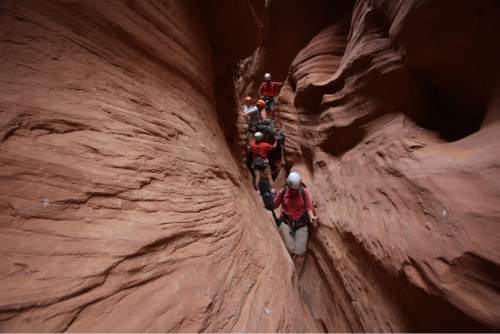This is an archived article that was published on sltrib.com in 2015, and information in the article may be outdated. It is provided only for personal research purposes and may not be reprinted.
One of the things of which I am most proud is that despite having only a double-digit IQ, I have never been the focus of a search and rescue operation.
Not once has a park ranger or volunteer searcher ever leaned over what's left of me and irritably demanded, "How the #%@* did you get way out here?"
This does not mean that I've always been where people expected. Over my life, parents, wife, court, editor, military, police watch commander and the like have often fumed, "When he finally shows up, I'm going to kill him."
But none of those have involved a coordinated rescue. It's pretty cool considering the places I've been and the people I normally hang with. Sonny and I have covered a lot of ground and never gotten lost.
We've been stuck before, and even injured, but never to the point where we couldn't get ourselves out of it once all the screaming and blame-assigning was over.
This is because we both possess a great sense of direction. He'll point into some bottomless canyon and say, "That way is down."
Or I'll offer, "And that light over there is the sun, but we'll have to wait a couple of minutes to figure out if it's morning or evening."
I've had a few narrow escapes. The closest I have ever been to being lost and needing rescue was as a teenager exploring an abandoned silver mine in southern California.
It was a fool's errand, but I managed to get myself out of it by following one of the most basic principles of spelunking or mine crawling.
Here it is: "When the light goes out for good, it's possible to still find your way by feeling along with your toes. It just takes longer."
It's true. Deprived of one of the most basic senses, the body's other senses will endeavor to compensate. By the time I got out of that #$%@ mine, I had toes that were 14 inches long.
I've learned other important things about not getting lost or hurt. Here are the top four:
1. Measure the amount of alcohol/drugs carried on a hike, then average it out over the number of people in the group, divide that number by 247.6, and that will be your safety ratio. Divide that in half if anyone in your group is a teenage male.
2. When rock climbing, it is always easier to go up than down. Know why? Because you can't see as well coming back down. It's not your fault. Evolution simply failed to provide you with a way to see with your ass.
3. Even if you expect to be gone a half-hour, carry at least 9 gallons of water per person. Nine gallons of water weighs about 75 pounds. Even strong idiots won't lug that much weight very far from the trailhead.
4. Pay attention to posted signs. If the sign says "We Still Haven't Found the Last Six People Who Went in Here," or a slot canyon is named "Satan's Colon," I'd stay out of it.
Those are just the things I've learned. You can find other important tips on how to keep yourself from being the subject of an expensive search and rescue operation online: http://bit.ly/hikesafe.
Finally, there's a reason why people get lost and trapped in areas referred to as "remote." It's not because they're far away. If you screw up, the word actually refers to your chances of ever being seen again.
Robert Kirby can be reached at rkirby@sltrib.com or facebook.com/stillnotpatbagley. Find his past columns at http://www.sltrib.com/lifestyle/kirby.



